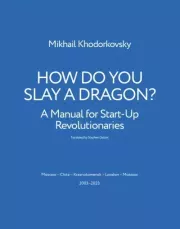Mikhail Khodorkovsky - How Do You Slay A Dragon
Название: | How Do You Slay A Dragon | |
Автор: | Mikhail Khodorkovsky | |
Жанр: | Старинная литература | |
Изадано в серии: | неизвестно | |
Издательство: | неизвестно | |
Год издания: | 2022 | |
ISBN: | неизвестно | |
Отзывы: | Комментировать | |
Рейтинг: | ||
Поделись книгой с друзьями! Помощь сайту: донат на оплату сервера | ||
Краткое содержание книги "How Do You Slay A Dragon"
Right at the start of this book, I had a great surprise. I know Mikhail Khodorkovsky’s story well. I reported for the BBC on his rise to prominence in the YUKOS oil company, his disputes with the newly-elected Russian President, Vladimir Putin, in the first years of the twenty-first century, and his arrest on trumped-up charges in October 2003 and subsequent imprisonment. Four days after his arrest I was due to have a meeting with him in Moscow. Instead, a meeting was arranged with a representative of the Russian Prosecutor’s Office to explain the arrest. The trial hadn’t yet begun. But the outcome was already evident.
К этой книге применимы такие ключевые слова (теги) как: Политика и события
Читаем онлайн "How Do You Slay A Dragon". [Страница - 6]
If the temporary government succeeds in establishing a strict “new course” then it would be realistic to consider that the long-term goals could be achieved. If, however, it’s unable to do this, and it slips into populism by simply carrying out the immediate wishes of the people, then we can forget about such ambitions. People's trust must be lasting, drawn out over a long period. It’s not difficult to gain the support of the majority over a short period of time. People grow weary of dictatorial regimes and in certain circumstances it takes just a spark to ignite passive dislike into active hatred. But such flare-ups quickly die down and the people can swiftly discard their new leaders. This is the weakness of the “Maidan-style” uprisings: the explosion happens easily enough, but the strength of the explosion is insufficient to carry matters through to their conclusion. In order to obtain lasting support, different, systemic decisions are needed, not just taking advantage of anger that’s been building up over a long period like social dynamite.
Considering all this, today we can at last make an accurate diagnosis of the 1990s. Surprisingly, this period has now once again become a subject of heated discussion. At that time, attempts to carry out lasting reforms failed. In my opinion this was specifically because the reformers ignored the essential task of enlisting society’s solid support. They naively believed that they could carry out changes while ignoring the views of the majority. At best, they assumed that they would remain neutral; in the worst case, they thought they could ride roughshod over any opposition. They chose a course of action that appealed ideologically to a small section of society that shared their radical “westernised” views. The economic beneficiaries of the reforms were also a very mixed – and at the same time tiny – group. The majority of the population not only suffered significant economic hardship from these changes, but the values that the reformers were preaching remained foreign to them. The inevitable outcome of such a situation was that society was alienated from the government and the path it was following. The consequences of this alienation were reflected in the mass support, initially a counter-revolution, for Putin’s reactionary political course. If we don’t want to repeat this scenario in the future we must not repeat the errors of the ’nineties.
An exceedingly difficult task will present itself from the outset to the temporary government: in a situation where there is a deep economic crisis and a fragmented society that is teetering on the edge of civil confrontation, how can problems be solved that have built up over many decades? How can such a government win the support of society for its actions?
If we put to one side any ideas for “a quick fix” based on the general dislike of the old regime (and experience shows that such dislike doesn’t last long), then all that’s left is to put into action a “left-wing plan” that would at least satisfy the fundamental economic demands of the majority of the population. It’s essential that the majority believes that the government’s actions strategically match their own long-term economic interests. Only then will the people be prepared to back the government in its difficult journey through the period of transition. In other words (and many people still fail to accept this) there’s a fairly simple calculation that has to be done that will limit any deep change in Russia: it will have to be carried out along with a “left-wing plan”. By “left-wing plan”, what I mean is that it must be geared towards the social and economic needs of the people; as opposed to the “right-wing plan” that satisfies the needs of the minority. Had the reformers in the 1990s not ignored the social needs of the majority of the people, it is quite possible that today we would not be trying to solve the problem of Putinism. If those who have set themselves the task of carrying out a political battle with the regime once again ignore the social and economic needs of the majority, they will never achieve their political goals.
Nowadays, everyone understands this. There are now no opposition forces that wouldn’t promise the Russian people social benefits and economic well-being along with political freedom and a state governed by the rule of law. Nevertheless, people don’t rush to believe such promises. For some, it’s because the 1990s are still fresh in their minds; for others, it’s because there are few concrete details in such promises, and much of what is said is unrealistic with the current state of the economy.
In order to win enough trust from the majority to carry out far-reaching changes, people shouldn’t be given promises of a wonderful life in some far-off future, but guarantees that will work right now. Strange as it may seem, such guarantees exist now, and can be presented to the people by a temporary government in exchange for long-term support of a reformist path. This involves returning to the people what was taken from them in the 1990s: namely benefitting from the extraction of natural resources, known as resource rent, and a fair distribution of property.
Resource rent is the principle source of wealth in Russia, both privately and publicly. Officially, resource rent today is controlled by the state; but in reality, it’s controlled by the mafia cabal that’s replaced the state. All ideas that are put forward regarding the fate of resource rent come back to one point: whatever force replaces the Putin regime has to ensure that the distribution of resource rent is done more fairly than it is today. In other words, the people will receive more than they do now. But since the Russian population has grown used to regarding anything related to the state with deep mistrust, they don’t believe in this crock of gold at the end of the rainbow, either.
But a completely different approach can be taken, one which excludes the state from its role as the distributor of resource rent among the population. In recent years, everyone has realised that there are two insoluble problems in Russia: pensions; and the unfair distribution of profits from the sale of natural resources. So why not solve one problem with the help of the other? Why not send profits from energy sales (which, in any case, are fixed separately from the rest of the budget) to citizens’ individual savings accounts, that could be opened directly in the Treasury? The sum that’s needed to pay fair pensions is almost exactly the same as the amount that goes into the budget from the exploitation of resource rent. So locking them together is totally logical. In one fell swoop, the Russian people are able directly to control resource rent, while putting a stop to feeding a gigantic bureaucracy and the mafia that’s attached itself to it. This is something that both can and should be done immediately after the temporary government takes over. It would open up a channel of political possibilities while implementing simple changes. This is the most important thing; but there is something else as well.
Clearly, it will be impossible in practice to restore trust between the state and
--">Книги схожие с «How Do You Slay A Dragon» по жанру, серии, автору или названию:
 |
| George R R Martin - The Rise of the Dragon Жанр: Старинная литература Год издания: 101 |
 |
| Mikhail Khodorkovsky - HOW DO YOU SLAY A DRAGON? Жанр: Старинная литература Год издания: 2022 |


